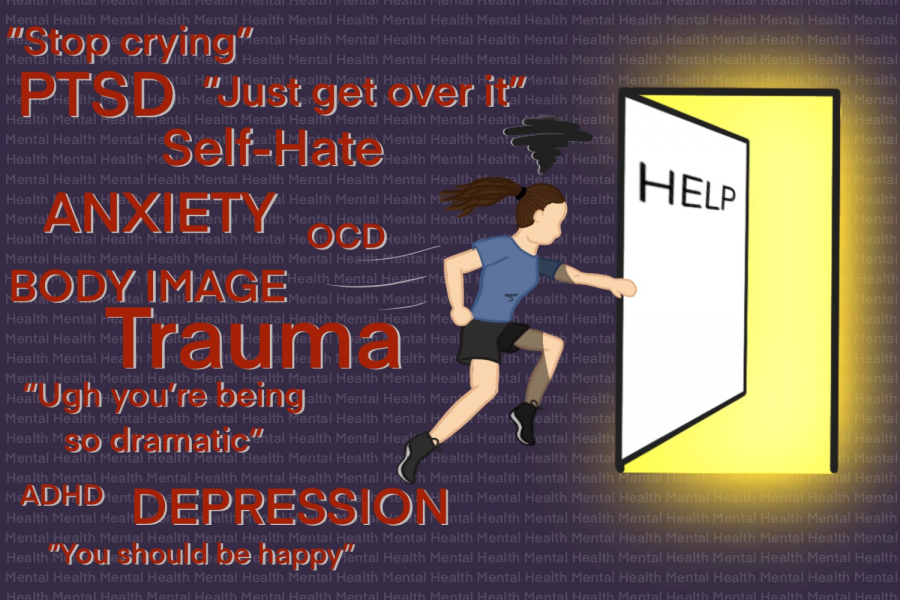Don’t Place Restrictions on my Mental Health
October 28, 2021
“Stop crying.”
“You are being so dramatic.”
“Just get over it.”
Newsflash, people who suffer from a mental health condition cannot “just get over it”.
To truly help a person dealing with a mental illness, it is important to provide them with professional help. However, in the U.S., mental health services are either insufficient or unavailable to the majority of people, with more than 56% of Americans seeking help. By not having access to proper treatment, on a nationwide and community scale, it places restrictions upon individuals and their mental health. These restrictions need to end as soon as possible, for the sake of those with mental health conditions.
There is not a small number of people in the U.S. that are suffering from mental health conditions; it is a widespread dilemma.
“Nearly one in five U.S. adults live with a mental illness (51.5 million in 2019),” claimed the National Institute of Mental Health (NIMH).
In an article for The National Council, there “is a mental health crisis in America…If we want to save lives, save families and save futures we must reimagine our behavioral health system and take concrete steps to improving consumers’ ability to find the care they need, when they need it, and on their terms,” Dr. Anthony Hassan said.
The first restriction placed on mental health treatment is due to the steep costs enforced by the government. From prescription medications, such as antidepressants, to psychotherapy, mental health treatment is not affordable whatsoever.
“One in four Americans reported having to choose between getting mental health treatment and paying for daily necessities,” said the National Council.
Another major hindrance in receiving treatment is lack of availability. This availability can be due to a limited number of mental health professionals or help centers in a patient’s area. This is especially prominent in rural areas where there are few to no mental healthcare providers whatsoever, so it is difficult to even obtain an appointment.
According to the National Council, “…the overwhelming majority of Americans (74%) do not believe such services are accessible for everyone, and about half (47%) believe options are limited.”
Additionally, another barrier people face is in regards to mental health awareness. Mental illnesses are more difficult to recognize compared to that of physical or bodily injuries, or illnesses. In this manner, mental illnesses can completely go under a person’s radar. People can dismiss their depression by thinking that it is simply a phase of unmotivation, while others can say that their anxiety is just them stressing over things too frequently.
Not only is awareness an issue, but the social stigma surrounding mental health conditions is concerning. Mental health stigmas can lead to disrimination towards your mental illness and your treatment.
Mayo Clinic outlined some harmful effects of stigma which included, “reluctance to seek help or treatment…Lack of understanding by family, friends, co-workers or others…Fewer opportunities for work, school or social activities or trouble finding housing…Bullying, physical violence or harassment…Health insurance that doesn’t adequately cover your mental illness treatment…The belief that you’ll never succeed at certain challenges or that you can’t improve your situation.”
Well, in my situation, my mental health care felt threatened by the Wellness Center restriction. I was worried when I heard that the Wellness Center here at Arcadia High School (AHS) was only allowing students to use its services for four, 20-minute sessions in a single quarter. Once I learned of these restrictions on the Wellness Center, I spoke with Ms. Anderson, the wellness counselor at AHS. She informed me that the Wellness Center will run on a case-by-case basis. Meaning, counseling sessions are not limited to the four, 20-minute sessions if a student needs more help than that. These restrictions were initially implemented because students were exploiting the services. Some students were using the Wellness Center to skip class or to avoid taking tests, which became a notable problem for the AHS administration. So, to all the AHS students who want to reach out for help, please do not feel restricted by the four, 20 minute limit and feel free to contact the Wellness Center when you truly need assistance.
In order for restrictions on mental health to be dissolved, there needs to be increased awareness about these barriers for treatment. Hopefully, the topic of mental health treatment gains traction so that people, like me and you, do not have to have restrictions on our mental health.

